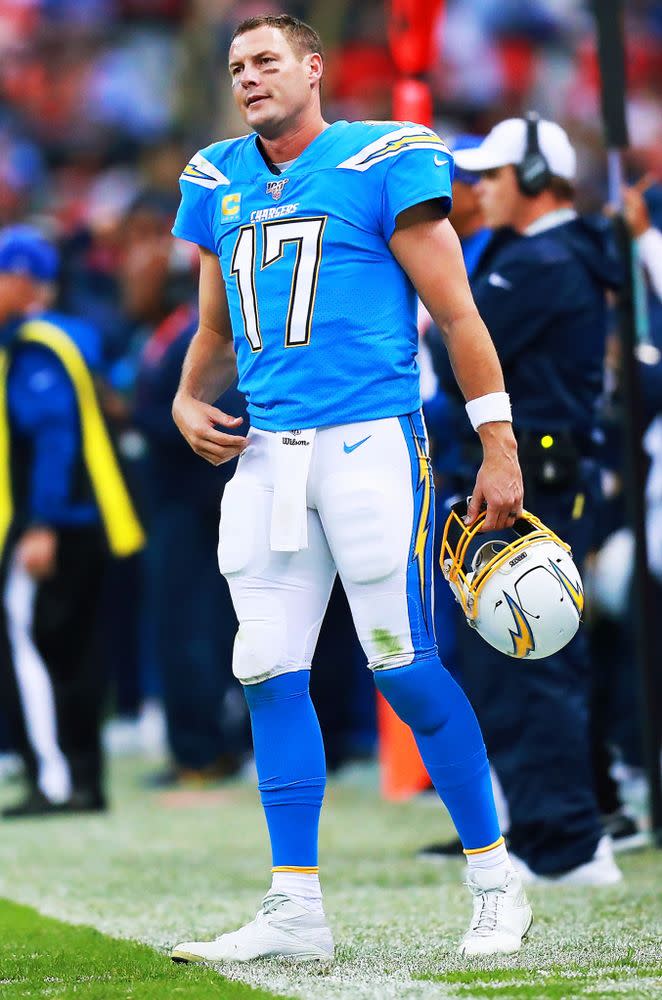Chargers Quarterback Philip Rivers and Wife Tiffany Open Up About Son’s Type 1 Diabetes Diagnosis

Los Angeles Chargers quarterback Philip Rivers and wife Tiffany Rivers are hoping to raise awareness for type 1 diabetes after their son was diagnosed with the condition when he was just 5 years old.
“It’s our everyday,” Tiffany tells PEOPLE of her son, Gunner, being diagnosed with the condition six years ago. “It’s our normal. It’s definitely a part of our life now.”
Type 1 diabetes is a condition typically diagnosed in children, teens and young adults, but can develop at any age, according to the Centers for Disease Control. It’s caused by an autoimmune reaction that triggers the body into destroying the cells in the pancreas responsible for producing insulin.
Insulin keeps the body’s blood sugar level from getting too high (known as hyperglycemia) or too low (hypoglycemia). Because type 1 diabetes is incurable, treatment to manage insulin levels includes injections or the use of an insulin pump.
The first symptoms of type 1 diabetes in children typically are frequent urination, weight loss and increased tiredness or moodiness. The American Diabetes Association also notes that if a child who is potty-trained starts having night accidents again, this could be a sign of diabetes.
It was some of these symptoms that Philip and Tiffany both noticed in Gunner when he was 5.
“He was starting to get really weak and tired,” Tiffany, who shares nine children with Philip, recalls. “He had to urinate a lot. He was always thirsty. We don’t have any diabetes in our family at all, so I didn’t know that that was a symptom, at all.”
RELATED: Country Star Eric Paslay Felt ‘Broken’ by Type 1 Diabetes — But Now He’s ‘Rocking at Life’

Type 1 diabetes is often confused with type 2 diabetes, where the body still produces insulin but is resistant to it.
Once the body begins attacking its insulin-producing cells, it can be years before someone shows symptoms. When they do, they can often be severe.
After a relative pointed out that Gunner’s symptoms resembled diabetes, his diagnosis was soon confirmed with a blood test.
RELATED: 11 Celebrities Who Are Living with Diabetes
“There’s no known cause or no known cure,” Tiffany recalls. “It was hard to hear that, but it was also brought some peace just knowing that it just happened to affect him. You can have the testing done to see if you carry the gene for it, but we didn’t have any idea about that at the time.”
The condition requires round-the-clock care, and Gunner, now 11, relies on daily injections to manage his levels.
“He’ll do injections every time he eats anything that has a carb in it,” Tiffany says. “He’s really steady with it, and it’s just become part of our life.”

RELATED: Nick Jonas Opens Up About Living with Type 1 Diabetes 14 Years After Diagnosis
Tiffany, who co-founded the bikini company The Hermoza with friend Marisa De Lecce, is throwing a campaign called “Change the Game,” where customers can pick up custom products that will see 100 percent of proceeds go to one of three diabetes foundations: JDRF, Insulin for Life and Diabetes Research Connection.
Purchasers will then be placed in a raffle to win field seats to the Chargers and Oakland Raiders game in Los Angeles on December 22 and will be able to meet Philip before the game.
“We really wanted to do a campaign that helped bring exposure and awareness to this disease, and help also bring more community light to a subject that a lot of people don’t know about and it is a completely different lifestyle change,” De Lecce says.
“What we’ve learned through our experience is that these kids are warriors,” Philip adds to PEOPLE. “We have seen first hand the tremendous responsibility it is for these children to have the discipline to manage the disease with the support of family, and their health providers to live their best lives.”

